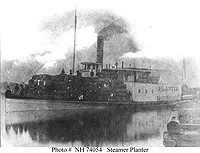Robert Smalls' extraordinary ability as a sailor led the Confederacy to choose the African-American as pilot for its gunship Planter, but Smalls' quest for freedom compelled him to commandeer the ship after its white officers had left it in the hands of its African-American sailors. He safely navigated the ship out of the harbor on May 13, 1862, and surrendered it to the Union.
Smalls' bravery was celebrated in the national press and his continued service to the nation led to his civilian appointment as the first black captain of a U.S. vessel on December 1, 1863 after an act of bravery under fire and ultimately to the appointment as U.S. Collector of Customs.
Illustrations from Harper's Weekly that accompanied the article on Smalls and the commandeering of the Planter.
Tenacity was a trait that Smalls exhibited throughout his life. He was born on April 5, 1839, in a small cabin behind the residence of John McKee at Prince and New Streets in Beaufort, SC. He was a strong-willed youth who refused to accept the plight of other slaves, and at age 12, he was sent to Charleston and hired out as a laborer, waiter and eventually as a sailor.
When the Civil War broke out, he became the pilot of the Planter, a ship retrofitted by the Confederacy as a gun boat with Smalls as pilot and a mostly black crew. Smalls worked with the crew to commandeer the ship and was able to smuggle his family on board prior to departure. His leadership and bravery in securing the ship for the Union caught the attention of the national press. On June 14, 1862, Harper's Weekly published an article along with line drawings of Smalls and the ship.
Following his commandeering of the Planter for the Union, Smalls went on a speaking tour about the daring feat to raise support for the Union. He returned to Beaufort in October 1862. In a speech on Thanksgiving Day, November 27, 1862, after telling the story of Smalls commandeering Planter, General Saxton said "...Today Rob[ert] came to see me..." to pilot the Planter, now a Union vessel.
During this period, his former master's house was put up for sale for back taxes, and Smalls purchased the property. (His ownership was contested in court in 1875, and the case was ultimately heard by the U.S. Supreme Court. Smalls prevailed, and the house remained in his family until 1953.)

Home of Robert Smalls in Beaufort, SC, that had belonged to his former master. Smalls' purchase of the house was contested in court and was decided in his favor by the U.S. Supreme Court.
Photo Credit:Historic American Buildings Survey
Following the Civil War, Smalls used his reputation as a war hero to launch a political career - first as a leader in the Republican Party in South Carolina then in the state legislature and ultimately as a five-term U.S. Congressman.
After losing his seat in Congress, he was appointed Collector of Customs for the Port of Beaufort in 1889 by President Benjamin Harrison. He lost the appointment during the presidency of Grover Cleveland, but President William McKinley reappointed him in 1898, and he served until 1913. As he neared the end of his tenure, he wrote Booker T. Washington that:
During the twenty odd years I have held the position of collector, I have succeeded to so manage affairs that when I leave it, I will do so with credit to myself, my family, and my race . . . the Customs House at Beaufort, while conducted by colored men, can be easily attached to the top or bottom, for whatever inspiration it may be to the Race."
Smalls died two years later in 1915.


